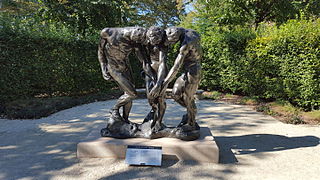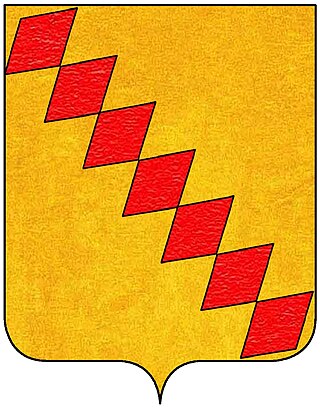
Dante Alighieri, most likely baptized Durante di Alighiero degli Alighieri and widely known and often referred to in English mononymously as Dante, was an Italian poet, writer, and philosopher. His Divine Comedy, originally called Comedìa and later christened Divina by Giovanni Boccaccio, is widely considered one of the most important poems of the Middle Ages and the greatest literary work in the Italian language.

The Guelphs and Ghibellines were factions supporting respectively the Pope and the Holy Roman Emperor in the Italian city-states of Central Italy and Northern Italy during the Middle Ages.

Brunetto Latini was an Italian philosopher, scholar, notary, politician and statesman. He was a teacher and friend of Dante Alighieri.

Guido Cavalcanti was an Italian poet. He was also a friend and intellectual influence on Dante Alighieri.

The Battle of Campaldino was fought between the Guelphs and Ghibellines on 11 June 1289. Mixed bands of pro-papal Guelf forces of Florence and allies, Pistoia, Lucca, Siena, and Prato, all loosely commanded by the paid condottiero Amerigo di Narbona with his own professional following, met a Ghibelline force from Arezzo including the perhaps reluctant bishop, Guglielmino degli Ubertini, in the plain of Campaldino, which leads from Pratovecchio to Poppi, part of the Tuscan countryside along the upper Arno called the Casentino. One of the combatants on the Guelph side was Dante Alighieri, twenty-four years old at the time.
Cavalcante de' Cavalcanti was a Florentine Epicurean philosopher and father of Guido Cavalcanti, a close friend of Dante Alighieri.

The Battle of Montaperti was fought on 4 September 1260 between Florence and Siena in Tuscany as part of the conflict between the Guelphs and Ghibellines. The Florentines were routed. It was the bloodiest battle fought in Medieval Italy, with more than 10,000 fatalities. An act of treachery during the battle is recorded by Dante Alighieri in the Inferno section of the Divine Comedy.

Manente degli Uberti, known as Farinata degli Uberti, was an Italian aristocrat and military leader of the Ghibelline faction in Florence. He was considered to be a heretic by some of his contemporaries, including Dante Alighieri, who mentioned Farinata in his Inferno.
The Order of the Blessed Virgin Mary, also called the Order of Saint Mary of the Tower or the Order of the Knights of the Mother of God, commonly the Knights of Saint Mary, was a military order founded in 1261. The order received its rule from Pope Urban IV, who expressly states the purpose of the organisation and the rights and obligations of its members:
[The members of the order] are to be allowed to bear arms for the defence of the catholic faith and ecclesiastical freedom, when specifically required to do so by the Roman church. For subduing civil discords they may carry only defensive weapons, provided they have the permission of the diocesan.

Iacopo Rusticucci was a Guelph politician and accomplished orator who lived and worked in Florence, Italy in the 13th century. Rusticucci is realized historically primarily in relation to the Adimari family, who wielded much power and prestige in thirteenth-century Florence, and to whom it is thought Rusticucci was a close companion, representative, and perhaps lawyer. Despite his association with men born into high political and social rank, Rusticucci was not born into nobility, and nothing is known of his ancestors or predecessors. The exact dates of his birth and death are unknown.

The House of Bardi was an influential Florentine family that started the powerful banking company Compagnia dei Bardi. In the 14th century the Bardis lent Edward III of England 900,000 gold florins, a debt which he failed to repay along with 600,000 florins borrowed from the Peruzzi family, leading to the collapse of both families' banks. During the 15th century the Bardi family continued to operate in various European centres, playing a notable role in financing some of the early voyages of discovery to America including those by Christopher Columbus and John Cabot.

The Florentine banking family of the Cerchi, minor nobles of the Valdarno, with a seat especially at Acone near Pontassieve, settled in Florence in the early thirteenth century and increased their fortunes. The family became the heads of a consortium of the prominent Guelfs that securely controlled Florence after the battle of Benevento in 1266. In Florence, the Cerchi purchased some of the ancient structures in the closely packed inner city formerly belonging to the counts Guidi, cheek-by-jowl with the proud Florentine family of the Donati, with whom their growing mutual antagonism was expressed in violent episodes that polarized Florence within a couple of decades in a virtual civil war that aligned behind two captains, Corso Donati of the Neri Guelf faction— the "Black" Guelfs of the old noble oligarchy— and Vieri de' Cerchi of the Bianchi, the moderate party that represented itself as champions of working people. The resulting violence lasted, with irruptions of tranquility, into the fourteenth century.

Corso Donati was a politician and leader of the Black Guelph faction in 13th- and early 14th- century Florence.
Gualdrada Berti dei Ravignani was a member of the Ghibelline nobility of twelfth-century Florence, Italy. A descendant of the Ravignani family and daughter of the powerful Bellincione Berti, Gualdrada later married into the Conti Guido family. Her character as a pure and virtuous Florentine woman is called upon by many late medieval Italian authors, including Dante Alighieri, Giovanni Boccaccio, and Giovanni Villani.

Inferno is the first part of Italian writer Dante Alighieri's 14th-century narrative poem The Divine Comedy. It is followed by Purgatorio and Paradiso. The Inferno describes the journey of a fictionalised version of Dante himself through Hell, guided by the ancient Roman poet Virgil. In the poem, Hell is depicted as nine concentric circles of torment located within the Earth; it is the "realm [...] of those who have rejected spiritual values by yielding to bestial appetites or violence, or by perverting their human intellect to fraud or malice against their fellowmen". As an allegory, the Divine Comedy represents the journey of the soul toward God, with the Inferno describing the recognition and rejection of sin.

The battle of Colle di Val d'Elsa took place between 16 and 17 June 1269 at Colle di Val d'Elsa between the Ghibelline troops of Siena and the Guelph troops of Charles of Anjou and Florence, represented by fewer than 200 knights commanded by Neri de' Bardi.

Poppi Castle is a medieval castle in Poppi, Tuscany, Italy, formerly the property of the noble Guidi family.

Bonconte I da Montefeltro was an Italian Ghibelline general. He led Ghibelline forces in several engagements until his battlefield death. Dante Alighieri featured Montefeltro as a character in the Divine Comedy.

The third circle of hell is depicted in Dante Alighieri's Inferno, the first part of the 14th-century poem Divine Comedy. Inferno tells the story of Dante's journey through a vision of the Christian hell ordered into nine circles corresponding to classifications of sin; the third circle represents the sin of gluttony, where the souls of the gluttonous are punished in a realm of icy mud.


















